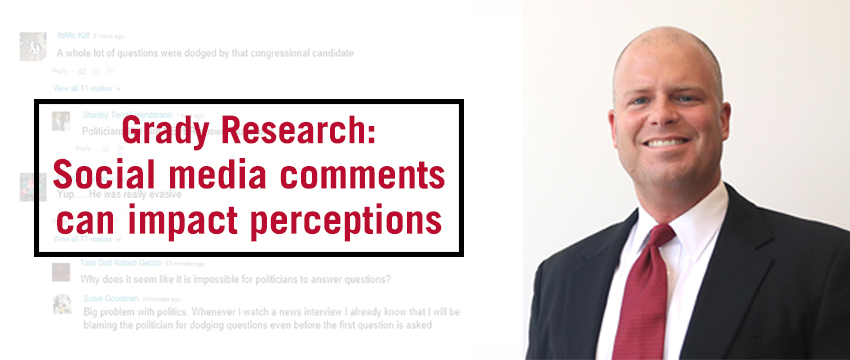Grady researcher studies the effect of comments associated with political interviews

Grady researcher studies the effect of comments associated with political interviews
As Americans prepare for another presidential election in 2020, a researcher at Grady College has found that comments left on social media posts about political interviews can, indeed, influence opinions.
“Comment sections are extremely powerful,” said David Clementson, an assistant professor of public relations at UGA’s Grady College of Journalism and Mass Communication and the study’s author. “This research found that people will echo the sentiments expressed by anonymous strangers and will share opinions and attitudes about politicians and journalists in accordance with comments expressed by strangers.”
Clementson researched the impact of social media comments posted after watching a staged video of a news interview with a non-partisan political figure and a journalist. The goal of the research was to determine the impact of comments made by strangers on those who viewed the interview.
The study, “How Web Comments Affect Perceptions of Political Interviews and Journalistic Control,” is the first experiment of its kind examining the impact of social media comments in relation to a political interview.
“The study shows that this is a frontier of extreme influence that isn’t getting as much attention as fake news and fake Tweets,” Clementson said.
“If your goal is to influence opinions, it’s a lot more time efficient, and perhaps more impactful, to post a comment than create a website or fake social media account.”
Clementson’s research asked the subjects to view the same mock interview on YouTube, then divided the subjects into three groups: 1. A control group that had no comments beneath the interview; 2. A group that viewed comments accusing the politician of being deceptive or dodging questions; and 3. A group that viewed comments accusing the journalist of being deceptive and biased.
The survey was run twice: once with participants 18- to 60-years-old, and once with adult college students.
The research groups were then asked to post their own comments, which were evaluated for the study.
The survey found that the group of 18- to 60-year-olds were so influenced by the comments that they echoed the comments themselves.
The college student group was not as influenced by the comments – the comments that they typed themselves did not echo the ones they read – but in their responses to survey items they did echo the attitudes of the comment sections that they were exposed to.
The survey also evaluated the extent to which the subjects agreed that the journalist was biased or that the politician was intrinsically deceptive with answers.
The group that viewed comments indicating that the journalist was making the interview tough on the politician, echoed previous comments. However, the journalist was still seen as more trustworthy than the politician.
On the other hand, those who viewed comments implicating the politician for dodging questions, were even more critical of the politician than the first group.
“Media outlets can rest assured that when a comment section impugns the credibility of their journalist, their journalist will probably still have more credibility than the politician, even when the comments defend the politician. The politician stands to lose more from comment sections,” Clementson said.
Comments add a lot to the experience of reading web articles, and make it easier to process confusing political news, Clementson continued. Studies show that in general, comment sections are widely read, even if many people don’t post their own views.
“Viewers and readers may not know what to believe, but comments can help fill in the gaps,” Clementson said.
The research was published in the 2019 edition of Political Psychology.